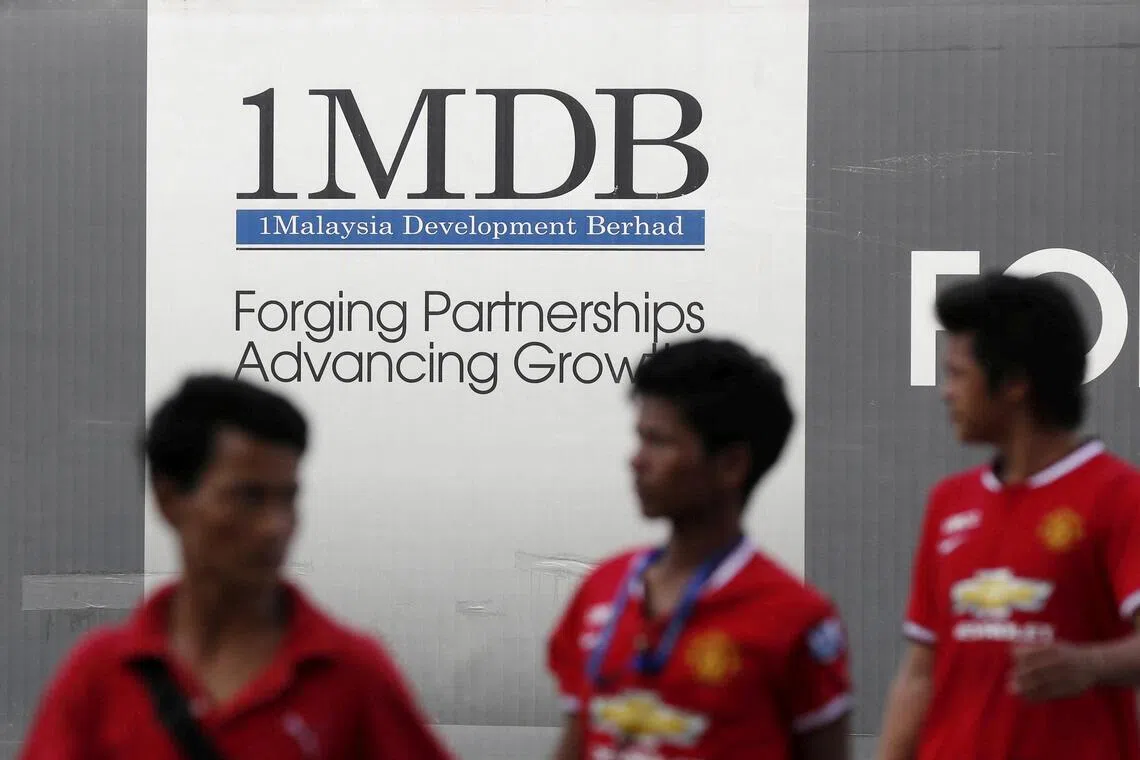S’pore High Court clears way for $3.5b suit against StanChart in 1MDB-linked claim to proceed
Sign up now: Get ST's newsletters delivered to your inbox

The Singapore High Court dismisses an attempt by Stanchart in the Republic to strike out a $3.5 billion lawsuit tied to 1MDB.
PHOTO: REUTERS
- Singapore High Court rejected Standard Chartered's bid to dismiss a US$2.7 billion lawsuit by 1MDB-linked entities’ liquidators, who allege the bank enabled fraudulent transfers.
- The liquidators claim Standard Chartered ignored "red flags" and breached anti-money laundering rules, facilitating the movement of stolen funds, including to Najib Razak.
- Standard Chartered disagrees with the decision and has filed an appeal, while liquidators aim to hold institutions accountable and recover misappropriated 1MDB funds.
AI generated
SINGAPORE – The Singapore High Court has dismissed an attempt by Standard Chartered Bank in the Republic to strike out a US$2.7 billion (S$3.5 billion) lawsuit
With the High Court denying StanChart’s application, the case is now set to proceed.
StanChart told The Straits Times that the bank “disagrees with the decision and will be filing an appeal”.
“We would like to reinforce that these are claims against the bank brought by shell companies that misappropriated funds from 1MDB and had no legitimate business. We emphatically reject the claims of these fraudulent entities,” it said.
The bank insists that the claims are without merit and that it would “vigorously defend” against them.
It said that the liquidators acting for these companies had publicly stated that these were shell companies that did not engage in any legitimate business, and were linked to fugitives Low Taek Jho and his associate Eric Tan.
“The companies are not affiliates of 1MDB. They operated under false pretences, and acted as a conduit for funds misappropriated from 1MDB to launder monies,” StanChart said.
The bank said it had reported the transaction activities of these companies before it shut their accounts in early 2013.
The claim was brought by court-appointed liquidators, Kroll’s Ms Angela Barkhouse and Ms Toni Shukla, on behalf of Alsen Chance Holdings, Blackstone Asia Real Estate Partners and Brightstone Jewellery.
The liquidators contend that between 2009 and 2013, StanChart permitted more than 100 intra-bank transfers that helped conceal the movement of stolen funds and ignored clear red flags.
They allege that the bank’s actions breached Singapore’s anti-money laundering controls and due diligence obligations, resulting in losses exceeding US$2.7 billion and S$20 million in public funds.
Among the cited transactions was a series of transactions amounting to US$150 million transfer from an account held by Blackstone to the personal account of former Malaysian prime minister Najib Razak.
Another series of payments from accounts belonging to Blackstone, Alsen Chance, and Brightstone allegedly funded luxury purchases by Najib’s wife, Rosmah Mansor, amounting to more than US$135 million.
They included a payment of US$77.02 million from the account held by Brightstone to jewellery, watch and bag vendors.
In 2016, the Monetary Authority of Singapore had imposed financial penalties of $5.2 million on StanChart and $2.4 million on Coutts & Co, Singapore Branch, for anti-money laundering violations linked to 1MDB.
Other banks, including Goldman Sachs, have also been penalised here and elsewhere for their role in the scandal.
Goldman Sachs Singapore had to pay US$122 million to the Singapore Government for the bank’s role in the 1MDB bond offerings corruption scandal.
The Wall Street bank, which allegedly failed to act while US$4.5 billion was looted from its client, 1MDB, had underwritten and arranged bond sales for the wealth fund totalling US$6.5 billion.
Goldman Sachs reached a US$3.9 billion settlement with Malaysia in 2020 to resolve criminal and regulatory charges, and two of its top executives – Tim Leissner and Roger Ng – were given prison sentences for their “central roles” in the scheme.
The lawsuit in Singapore, filed by the liquidators on June 30, 2025, is part of a broader international push to recover assets siphoned from the Malaysian state fund.
In a statement, the liquidators said they were pleased that the application had been dismissed.
“This enables us to press ahead in holding financial institutions and individuals accountable for their roles in the misappropriation of 1MDB funds and to continue recovering assets that belong to the people of Malaysia,” they said.
The latest announcement follows a September High Court decision to prevent foreign liquidators from suing StanChart and BSI Bank over transactions allegedly linked to the 1MDB scandal.
The court ruled then that Singapore’s cross-border insolvency framework cannot be applied to deals executed before the law took effect in 2018.
1MDB, a sovereign wealth fund co-founded by Najib in 2009 while he was premier, has faced corruption probes in at least six countries over the alleged misappropriation of over US$4.5 billion by high-level officials of the fund and their associates.
Malaysia’s top court in 2022 upheld a guilty verdict against Najib for corruption and money laundering for illegally receiving about US$10 million from former 1MDB unit SRC International, sentencing him to 12 years in prison. The sentence was later halved by a pardons board chaired by Malaysia’s former king.
Najib, 72, has consistently denied wrongdoing, and maintained he had no knowledge of illegal transfers.



